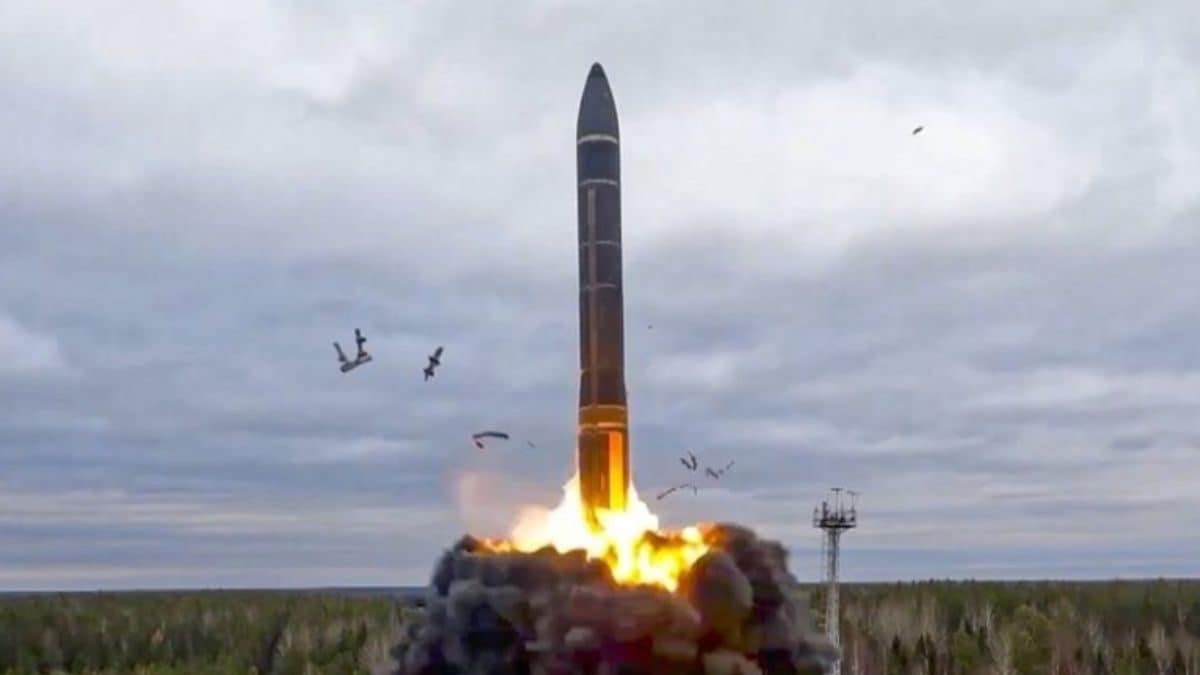Last Updated: September 23, 2024, 13:01 IST
Beirut, Lebanon

Smoke billows over southern Lebanon following Israeli strikes, amid ongoing cross-border hostilities between Hezbollah and Israeli forces, as seen from Tyre, southern Lebanon September 23, 2024. (Reuter)
Hezbollah declares a "new phase" in war as Israel warns it will "hit anyone." Tensions escalate amid cross-border attacks and international calls for de-escalation
Israel and Hezbollah threatened on Sunday to escalate their cross-border attacks despite international pleas to step back from the brink of all-out war that would ravage the West Asia region.
After facing a barrage of rocket fire from Lebanon last week, IDF dealt a series of blows to the Iranian-backed outfit, even as a defiant Hezbollah deputy chief Naim Qassem announced the group was in a “new phase” in its battle against Israel. Undeterred IDF Chief of Staff Lt.-Gen. Herzi Halevi has threatened more assassinations and the destruction of Hezbollah, the Jerusalem Post reported.
Hours after Hezbollah tried to harm Israelis deeper into the country than ever with around 150 rockets and drones, Halevi on Sunday said the price that “Hezbollah will pay will only grow.” Later on Monday, the Israeli military told people in Lebanon to move away from Hezbollah targets and vowed to carry out more “extensive and precise” strikes against the Iran-backed group.
‘We advise civilians from Lebanon…’
“We advise civilians from Lebanese villages located in and next to buildings and areas used by Hezbollah for military purposes, such as those used to store weapons, to immediately move out of harm’s way for their own safety,” military spokesman Rear Admiral Daniel Hagari said in a media briefing. “The IDF (military) will engage in (more) extensive and precise strikes against terror targets which have been embedded widely throughout Lebanon.” Hagari said the military had launched new strikes against Hezbollah sites since Monday morning. “The strikes will go on for the near future,” he said.
What’s Israel’s Military Strategy
In a Maariv interview on Sunday, former IDF Air Defense commander Brig.-Gen. Zvika Haimovich voiced his skepticism about his country’s current military strategy, which he says does not align with the war goals to restore the North. “We’ve seen cyber and psychological operations on Tuesday and Wednesday, and on Friday, the targeted killing of Ibrahim Aqil. But the question is, are these tactical actions really part of achieving the larger goal?”
Speaking about the Hezbollah leader Hassan Nasrallah’s promise to get revenge on Israel, Haimovich said, “For the first time, Nasrallah admitted, ‘We suffered the hardest blow.’ But just a moment later, he doubled down on his long-standing position since the war began: Israel is caught in a multi-front conflict. His doctrine is clear—if Gaza is quiet, Hezbollah will hold fire as well. For him, the war of attrition is the right path.”
‘Unwritten rules’
Haimovich stressed that while Israel’s tactical operations have been impressive, they are not enough to force Nasrallah into a truce. “These actions, successful as they are, won’t change his position.” He warned that Israel must be ready for a response from the Lebanese outfit that breaks the current “unwritten rules” between the two sides.
“We need to prepare for the possibility that Hezbollah will strike beyond the usual scope—whether that’s drones targeting Haifa, national infrastructure in places like Hadera or Tel Aviv, or a combination of the two. We must also stay alert to other potential fronts, as I believe there is coordination between Iran and Hezbollah. Any response could include unresolved issues from Iran as well,” he was quoted as saying by the Israeli newspaper.
‘Escalate to de-escalate’: What US Fears
Amid escalating tensions on the northern border, Israeli media reported on Sunday evening that the US government has conveyed a stern warning to Israel, urging the country not to reach the highest level of military response against Hezbollah. The Biden administration fears a full-scale war in the region could draw the United States into a broader conflict. The message from Washington to Israel reflects concerns about the recent security escalation and emphasizes caution, according to KAN News.
The US reportedly understands Israel’s new tactical approach, often referred to as “escalate to de-escalate,” but cautions against crossing a critical threshold in its responses. US officials reportedly advised their Israeli counterparts to “leave room for a diplomatic solution” even when responding. Channel 12 News quoted unnamed diplomatic sources saying, “The American message emphasizes an understanding of Israel’s need to respond to Hezbollah’s provocations. However, there is a clear call for restraint to avoid a broader confrontation.”

 1 month ago
1 month ago

















